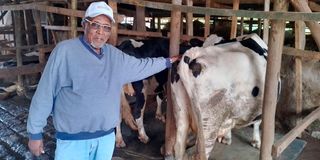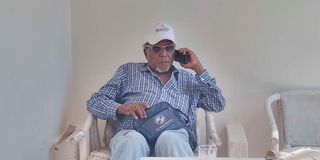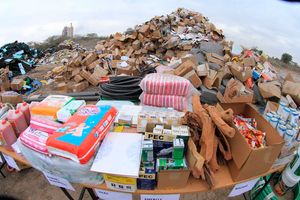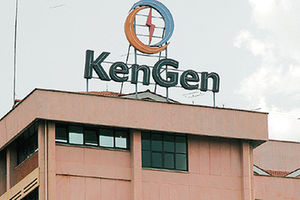
Former ambassador John Baptista Kirore Mwaura with some of his dairy cows at his Samar village farm on June 21, 2025.
After his tenure as Kenya's ambassador to Germany, where he was also in charge of Austria and Netherlands between 1977 and 1982 ended, Mr John Baptista Kirore (JBK) Mwaura served as Deputy Principal Secretary until 1990 when he retired.
He served in the ministries of Public Works, Local government and Labour and decided to join politics.
Mr Kirore (the name he prefers as his identity) was elected as Kigumo MP in the 1992 General Election where despite being an opposition legislator on Ford Asili party led by Mr Kenneth Matiba, he became close with President Daniel Moi.
He lost the seat in 1997 to Onesmus Kihara Mwangi, even after jumping ship to Kanu.
Commercial ventures
With his political door firmly slammed shut by Kigumo voters, Mr Kirore, who turns 90 in August, became a realtor where he started building homes for commercial ventures.
As he searched for more ventures to keep himself busy, Mr Kirore founded a school in his Gwa Kirore home compound but it went under in under three years after a mysterious fire engulfed it, luckily with no casualties.
He sold off the compound and moved into his more than 100-acre farm in Samar along Mbombo-Igikiro road off Kenol Murang'a road and decided to be a farmer.

Former ambassador John Baptista Kirore Mwaura.
That is where more economic nightmares followed him since his maiden venture was to grow french beans in the whole of that 100 acre land.
"It was a massive project that saw me pump cash into irrigation infrastructure, land preparation, seeds, husbandry, labour...but after three years, my auditors told me that I had made a loss of Sh10 million," he reminisces.
He says the worst financial haemorrhage in his maiden agricultural venture was electricity bills that were costing him on average Sh250,000 per month.
"This means that pumping irrigation water in the 100 acres plantation in the three years cost me Sh9 million. My net sales in the three years were Sh15 million. Minus Sh16 million other expenses and my ledger books posted Sh10 million loss," he says.
Mr Kirore says the loss nearly depressed him since he had four children studying in European universities and where the fees burden was mountainous.
"It took me 10 years of struggling to find my economic footing back on cause. I had to sell off a home in Nairobi, sell off 60 acres of my 100 acres land...Behind every successful story are tonnes of sweat, tears and sometimes blood... I suffered," he says.
In trying to see whether his Kigumo voters had forgiven or forgot his 1997 miscalculation, he vied again but his performance was negligible--the voters had marked him for slaying.
He went into soul searching, nursing his political and agricultural injuries and after he felt he was strong enough to dare again, decided to risk.
Mr Kirore said he went back into agriculture in 2015 where he started breeding dairy cows that within an year were producing 2,000 litres of milk, giving him about Sh70,000 as gross income per day.
He also ventured into banana farming in 20 acres that within an year were posting about Sh300,000 as gross income per month.
"I deduced that the cost of production in the dairy sector was huge and I was just playing with money as if shuffling cards...I went slow on dairy sector expansion, maintaining a small herd that would produce 200 litres and giving me a net earning of Sh7,000 per day," he says.
Mr Kirore further ventured into tomato farming in five acres but abandoned it when he became prone to weather based floods and diseases hanging him huge losses.
Hass avocado
"It was in 2018 when I grabbed the Hass avocado and Macadamia craze and Eureka - I found it," he says.
He says "these two are the magical trees that I should have started with during my naivety of french beans and tomatoes... I would have saved myself the pain and anguish".

Grafted avocados of Hass variety
Mr Kirore says "Avocado and Macadamia trees are weather hardened, have no extensive labour and all you do is plant them and wait for harvests while incurring low costs in maintaining them".
He says he planted 2,500 avocado seedlings and an equal number of macadamia trees and currently he is in the market and smiling all the way to the banks.
A man who at 90 drives himself, swims and patrols his land without the nagging pain of arthritis says he has now discovered the direct highway to a fortune if he gets his math right.
"And I have no intention of getting it wrong...only that the government must also behave in ensuring those of us investing in agribusiness make it for the benefit of the national economy," he says.
He currently says his avocado sales are peaking, currently standing at 100 tonnes harvests per year as he heads to maximised of about 500 tonnes.
He says his macadamia trees are also catching up past, currently producing 8 tonnes per year as he works for the optimised 30 tonnes.
"My ultimate goal as of now is to invest in a value addition drive that will see me produce a variety of oils from the two harvests. I will increase my net gain by over 70 per cent," he says.
In a day, his land employs about 50 casual labourers drawn from his neighbourhood "and this gives me immense satisfaction that from my political service, I am still creating wealth for the country".









